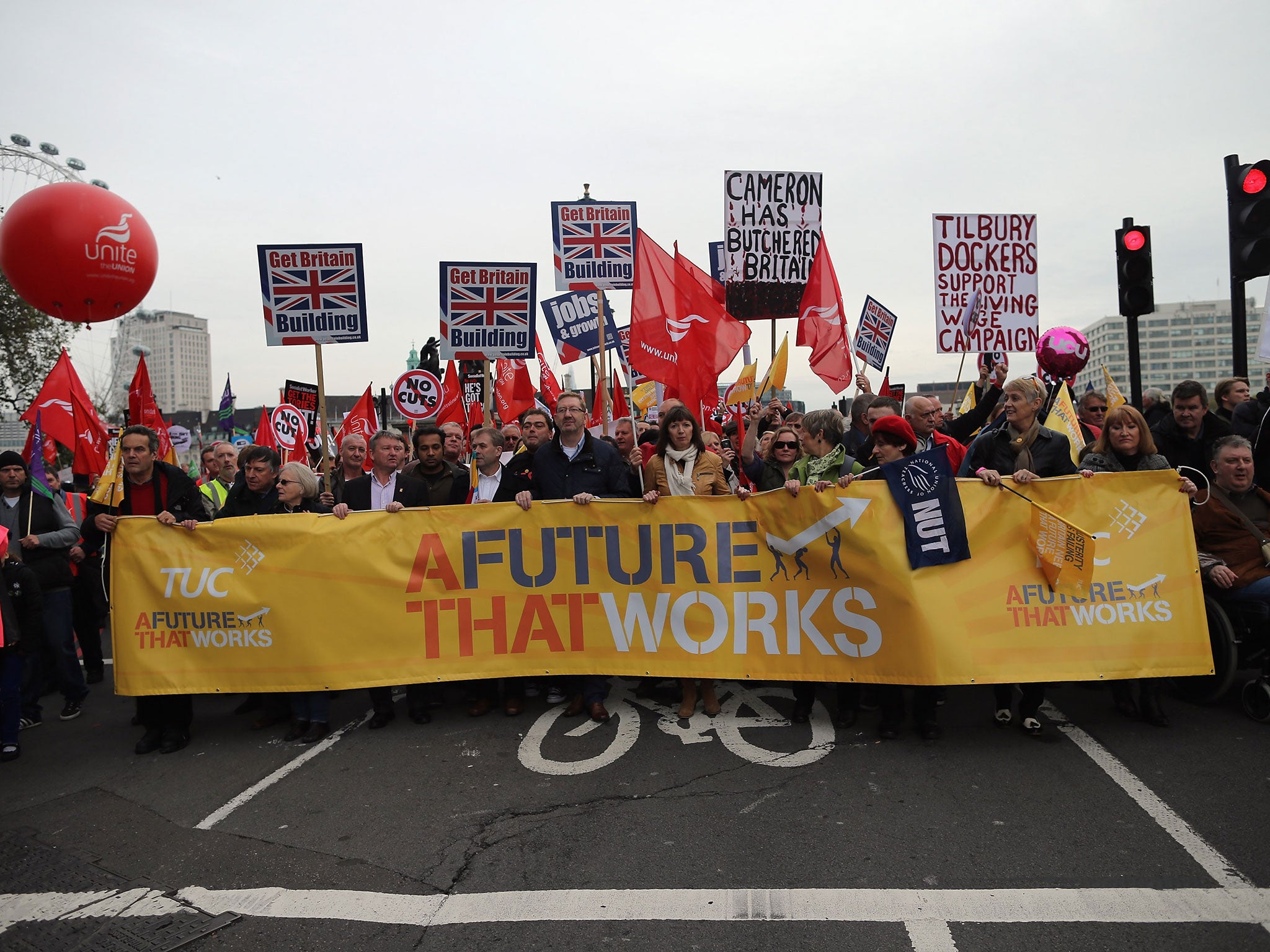Working families hit twice as hard by Coalition cuts as jobseekers
TUC research will be damaging to David Cameron

Working families will be the worst hit by the latest welfare reforms, facing twice as many social security cuts as the unemployed, research by the TUC shows.
The findings will be an embarrassment for David Cameron, who has made repeated pledges that the Government will make life better “hard-working families”. The damaging report comes just days after the Prime Minister promised to make sure policies passed the “family test” and benefited parents and their children.
Three quarters of all welfare cuts to people of working age will be on working households, according to analysis of welfare changes announced in the current Parliament by Landman Economics for the TUC. Almost half of these affected people in work are families with children.
Overall, working households will suffer benefit cuts worth £17.9bn a year by the financial year to 2017, more than twice the level (£6.2bn a year) experienced by those out of work.
TUC General Secretary Frances O’Grady said: “Ministers like to say that their welfare reforms target work-shy scroungers and will get them back to work. But the fact is that the bulk of the cuts hit low-paid families already in work, as well as pensioners who have no way to make up the money lost as a result of the Chancellor’s social security axe.
“With nearly half the total cost of welfare changes falling on working families with children, the Prime Minister has already failed his own new family test, announced just this week.”
Working families with children stand to lose the most – £11.7bn a year. Out of work families with children will lose a further £2.3bn a year, bringing the total cost of welfare cuts to families with children to £14.1bn a year by 2017.
Alison Garnham, chief executive of Child Poverty Action Group, said: “This detailed analysis from the TUC reveals just how hollow the talk of supporting hardworking families has been when it comes to social security. Despite the crude caricatures used to justify many of them, the dozens of cuts we’ve seen since 2010 to benefits and tax credits haven’t fallen primarily on people unfortunate to be out of work because they’ve lost their jobs, but on working families, including those with children.”
The TUC says the impact of the benefits cap – which targets around 65,000 mainly workless households and is projected to save £500m a year - is dwarfed by cuts in support to working families and pensioners.
The biggest single area of welfare cuts announced has been the £13.8bn of annual cuts to tax credits – more than 90 per cent of which will hit working families. Those in work will also face more than 90 per cent of the cuts in child benefit, losing £3.4bn a year by 2017.
Shadow Work and Pensions Minister Kate Green, said: “While millionaires have seen their taxes cut, ordinary families have been hit hard by the Tories’ cost-of-living crisis and unfair policies like the hated Bedroom Tax, which catches 220,000 households with children. And projected spending on social security is going up not down, because more and more working people are reliant on tax credits and housing benefit to pay for food, fuel and rent. Labour will stand up for parents struggling to make ends meet by extending free childcare, tackling low pay and freezing energy prices.”
Many of the reductions in social security support follow a stealth cut to benefits, announced in June 2010, where the inflation measure used to increase benefits every year was changed from RPI to the lower CPI measure.
A DWP spokeswoman said: “This Government inherited a benefits system in meltdown, which trapped the very families it was designed to help in cycles of worklessness and welfare dependency. Our welfare reforms will improve the lives of some of the poorest families in our communities with Universal Credit making three million households better off and lifting up to 250,000 children out of poverty.”
Case study: "How can the Government do this to hard-working families?"
Mark Payne, 42, a supermarket delivery driver, had his Child Tax Credit reduced from £180 to £160 a week in April.
The father-of-three, who earns about £14,000 a year, said the loss of just over £1,000 a year has been “absolutely horrendous.”
It has left him and his partner Agnes McFadyen, 32, who works two days a week on £7.28 an hour, struggling to provide for their children Brandon, 11, Analiece, nine, and Layla, two.
Mr Payne, from Port Glasgow, Renfrewshire, Scotland, said: “I find myself thinking about it 24/7. We try to keep the food nutritious, but sometimes you have to buy the kids food you don’t really want to give them, like chicken nuggets, because they’re cheap – a bag of 70 for less than £2.
“This year, we’ve had to tell the kids there’ll be no summer holiday. My wee boy tells me ‘It’s all right Dad, I know things are tight.’
“He makes me proud, but it’s also heartbreaking. You feel you are letting them down."
Mr Payne’s five-day week involves working on Saturdays as well as two evening shifts and one 10-hour day.
“My two days off are when Agnes is working, so we hardly ever see each other. We haven’t had a night out on our own for about five years. You work hard to provide for your kids, and to end up with hardly anything from it is soul destroying. How can the Government do this to hard-working families? They won’t do anything to their friends the bankers, but they’ve stabbed us in the back.”
Adam Lusher
Subscribe to Independent Premium to bookmark this article
Want to bookmark your favourite articles and stories to read or reference later? Start your Independent Premium subscription today.

Join our commenting forum
Join thought-provoking conversations, follow other Independent readers and see their replies